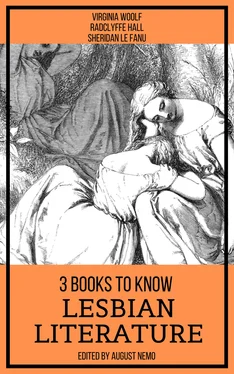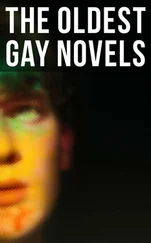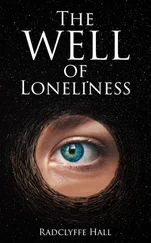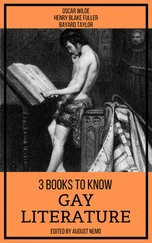He was careful to avoid meeting anyone. There was Stubbs, the gardener, coming along the path. He hid behind a tree till he had passed. He let himself out at a little gate in the garden wall. He skirted all stables, kennels, breweries, carpenters' shops, washhouses, places where they make tallow candles, kill oxen, forge horse-shoes, stitch jerkins—for the house was a town ringing with men at work at their various crafts—and gained the ferny path leading uphill through the park unseen. There is perhaps a kinship among qualities; one draws another along with it; and the biographer should here call attention to the fact that this clumsiness is often mated with a love of solitude. Having stumbled over a chest, Orlando naturally loved solitary places, vast views, and to feel himself for ever and ever and ever alone.
So, after a long silence, 'I am alone', he breathed at last, opening his lips for the first time in this record. He had walked very quickly uphill through ferns and hawthorn bushes, startling deer and wild birds, to a place crowned by a single oak tree. It was very high, so high indeed that nineteen English counties could be seen beneath; and on clear days thirty or perhaps forty, if the weather was very fine. Sometimes one could see the English Channel, wave reiterating upon wave. Rivers could be seen and pleasure boats gliding on them; and galleons setting out to sea; and armadas with puffs of smoke from which came the dull thud of cannon firing; and forts on the coast; and castles among the meadows; and here a watch tower; and there a fortress; and again some vast mansion like that of Orlando's father, massed like a town in the valley circled by walls. To the east there were the spires of London and the smoke of the city; and perhaps on the very sky line, when the wind was in the right quarter, the craggy top and serrated edges of Snowdon herself showed mountainous among the clouds. For a moment Orlando stood counting, gazing, recognizing. That was his father's house; that his uncle's. His aunt owned those three great turrets among the trees there. The heath was theirs and the forest; the pheasant and the deer, the fox, the badger, and the butterfly.
He sighed profoundly, and flung himself—there was a passion in his movements which deserves the word—on the earth at the foot of the oak tree. He loved, beneath all this summer transiency, to feel the earth's spine beneath him; for such he took the hard root of the oak tree to be; or, for image followed image, it was the back of a great horse that he was riding, or the deck of a tumbling ship—it was anything indeed, so long as it was hard, for he felt the need of something which he could attach his floating heart to; the heart that tugged at his side; the heart that seemed filled with spiced and amorous gales every evening about this time when he walked out. To the oak tree he tied it and as he lay there, gradually the flutter in and about him stilled itself; the little leaves hung, the deer stopped; the pale summer clouds stayed; his limbs grew heavy on the ground; and he lay so still that by degrees the deer stepped nearer and the rooks wheeled round him and the swallows dipped and circled and the dragonflies shot past, as if all the fertility and amorous activity of a summer's evening were woven web-like about his body.
After an hour or so—the sun was rapidly sinking, the white clouds had turned red, the hills were violet, the woods purple, the valleys black—a trumpet sounded. Orlando leapt to his feet. The shrill sound came from the valley. It came from a dark spot down there; a spot compact and mapped out; a maze; a town, yet girt about with walls; it came from the heart of his own great house in the valley, which, dark before, even as he looked and the single trumpet duplicated and reduplicated itself with other shriller sounds, lost its darkness and became pierced with lights. Some were small hurrying lights, as if servants dashed along corridors to answer summonses; others were high and lustrous lights, as if they burnt in empty banqueting-halls made ready to receive guests who had not come; and others dipped and waved and sank and rose, as if held in the hands of troops of serving men, bending, kneeling, rising, receiving, guarding, and escorting with all dignity indoors a great Princess alighting from her chariot. Coaches turned and wheeled in the courtyard. Horses tossed their plumes. The Queen had come.
Orlando looked no more. He dashed downhill. He let himself in at a wicket gate. He tore up the winding staircase. He reached his room. He tossed his stockings to one side of the room, his jerkin to the other. He dipped his head. He scoured his hands. He pared his finger nails. With no more than six inches of looking-glass and a pair of old candles to help him, he had thrust on crimson breeches, lace collar, waistcoat of taffeta, and shoes with rosettes on them as big as double dahlias in less than ten minutes by the stable clock. He was ready. He was flushed. He was excited, But he was terribly late.
By short cuts known to him, he made his way now through the vast congeries of rooms and staircases to the banqueting-hall, five acres distant on the other side of the house. But half-way there, in the back quarters where the servants lived, he stopped. The door of Mrs Stewkley's sitting-room stood open—she was gone, doubtless, with all her keys to wait upon her mistress. But there, sitting at the servant's dinner table with a tankard beside him and paper in front of him, sat a rather fat, shabby man, whose ruff was a thought dirty, and whose clothes were of hodden brown. He held a pen in his hand, but he was not writing. He seemed in the act of rolling some thought up and down, to and fro in his mind till it gathered shape or momentum to his liking. His eyes, globed and clouded like some green stone of curious texture, were fixed. He did not see Orlando. For all his hurry, Orlando stopped dead. Was this a poet? Was he writing poetry? 'Tell me', he wanted to say, 'everything in the whole world'—for he had the wildest, most absurd, extravagant ideas about poets and poetry—but how speak to a man who does not see you? who sees ogres, satyrs, perhaps the depths of the sea instead? So Orlando stood gazing while the man turned his pen in his fingers, this way and that way; and gazed and mused; and then, very quickly, wrote half-a-dozen lines and looked up. Whereupon Orlando, overcome with shyness, darted off and reached the banqueting-hall only just in time to sink upon his knees and, hanging his head in confusion, to offer a bowl of rose water to the great Queen herself.
Such was his shyness that he saw no more of her than her ringed hands in water; but it was enough. It was a memorable hand; a thin hand with long fingers always curling as if round orb or sceptre; a nervous, crabbed, sickly hand; a commanding hand too; a hand that had only to raise itself for a head to fall; a hand, he guessed, attached to an old body that smelt like a cupboard in which furs are kept in camphor; which body was yet caparisoned in all sorts of brocades and gems; and held itself very upright though perhaps in pain from sciatica; and never flinched though strung together by a thousand fears; and the Queen's eyes were light yellow. All this he felt as the great rings flashed in the water and then something pressed his hair—which, perhaps, accounts for his seeing nothing more likely to be of use to a historian. And in truth, his mind was such a welter of opposites—of the night and the blazing candles, of the shabby poet and the great Queen, of silent fields and the clatter of serving men—that he could see nothing; or only a hand.
By the same showing, the Queen herself can have seen only a head. But if it is possible from a hand to deduce a body, informed with all the attributes of a great Queen, her crabbedness, courage, frailty, and terror, surely a head can be as fertile, looked down upon from a chair of state by a lady whose eyes were always, if the waxworks at the Abbey are to be trusted, wide open. The long, curled hair, the dark head bent so reverently, so innocently before her, implied a pair of the finest legs that a young nobleman has ever stood upright upon; and violet eyes; and a heart of gold; and loyalty and manly charm—all qualities which the old woman loved the more the more they failed her. For she was growing old and worn and bent before her time. The sound of cannon was always in her ears. She saw always the glistening poison drop and the long stiletto. As she sat at table she listened; she heard the guns in the Channel; she dreaded—was that a curse, was that a whisper? Innocence, simplicity, were all the more dear to her for the dark background she set them against. And it was that same night, so tradition has it, when Orlando was sound asleep, that she made over formally, putting her hand and seal finally to the parchment, the gift of the great monastic house that had been the Archbishop's and then the King's to Orlando's father.
Читать дальше












